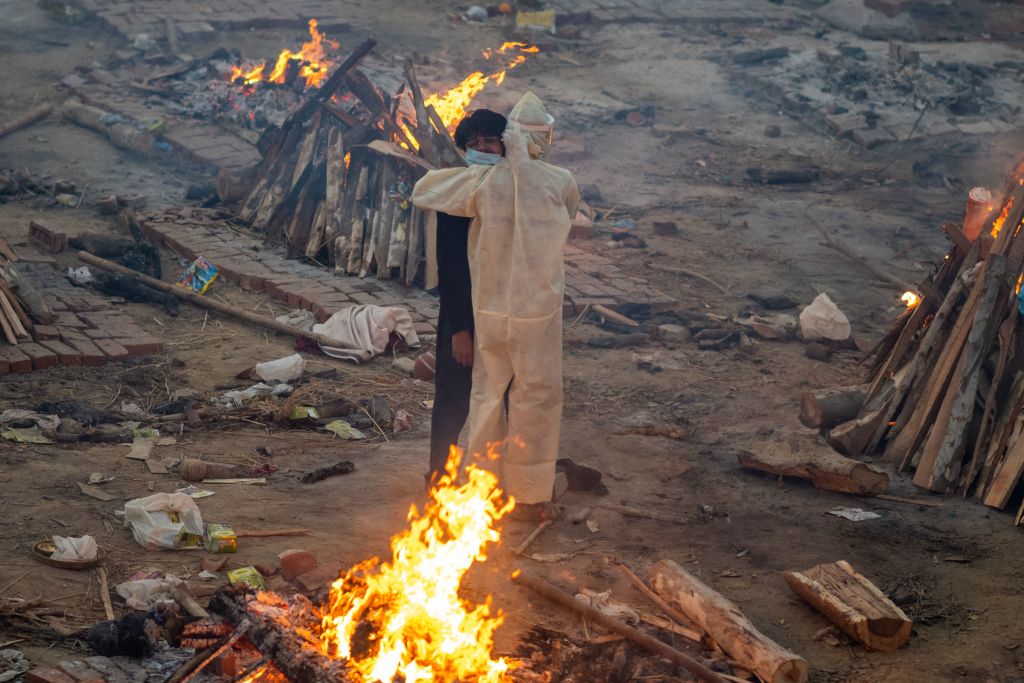India’s Covid situation is dire: hospitals have run out of beds (some hospitals are treating patients in cars), people are turning to the black market for drugs and oxygen cylinders, and mass cremations are taking place in car parks. The official daily death toll is around 2000, but the likely reality is much, much higher.
Britain has offered to help by sending 600 pieces of medical equipment to support the country in its Covid crisis. But the reality is that our country could do much more to help its ally than just offer a token shipment of supplies.
The UK continues to block a patent waiver designed to boost the global production of Covid vaccines. The proposal, jointly submitted by India and South Africa in October and backed by over 100 (mostly developing) nations, has been stonewalled by a small number of countries, including the UK, US, the EU, Switzerland, Japan, Norway and Brazil.
There seem to be two main reasons why the UK is blocking the waiver.
The reality is that our country could do much more to help its ally than just offer a token shipment of supplies
First, innovation is costly and risky, and intellectual property rights provide financial incentives which drive research and competition. It’s a fair point, but it’s hard to stomach the idea of a public health emergency also being a private profit opportunity.
To put it in perspective, three of the leading Covid vaccine manufacturers have paid out £18billion in dividends and stock buyouts to shareholders; campaigners say this is enough to cover the cost of vaccinating the population of Africa. (Although, to be fair, AstraZeneca, which is providing vaccines at cost price, is included in that figure).
Many countries also have a legal (and so far unused) loophole called ‘compulsory license’. In exceptional or extraordinary circumstances, a government can authorise third parties to make, sell or use a patented invention. If applied through a patent office then it is a lengthy, complex process that varies from country to country. But organisations could simply authorise a license themselves. Various organisations have requested voluntary licenses: for example, Canada’s Biolyse Pharma Corp. Or South Africa’s Biovac Factory and Bangladesh’s Incepta plant. All so far with no luck.
Neither voluntary or compulsory licenses require companies to be completely altruistic. In both cases, patent-holders receive ‘reasonable compensation’ that takes into account costs and investments. So why aren’t companies authorising a license to allow the life-saving vaccines to be reproduced? The answer appears to be simple: greed.
The second apparent reason for the block is that waiving patents may not be the promised ‘silver bullet’. Of course there are other barriers to consider: in February, Biden implemented the Defense Production Act, which granted him broad industrialisation-mobilisation powers. However, it also left US companies no option but to prioritise domestic production. These export controls, and subsequent international stockpiling, have clogged up the supply chain amid a worldwide shortage of raw materials.
Another problem is that even if some companies choose not to enforce their patents (as is the case with Moderna), the vaccines will be impossible to reproduce unless the company behind it also shares its intel. Graham Dutfield, a professor at Leeds university, likened it to publishing a recipe without the instructions and measurements; companies also need to share knowledge around technologies, processes and equipment, as well as the patents themselves, if supply is going to meet global demand.
Upscaling production is a daunting task, but it is a necessary one. There is already a shocking imbalance in vaccine distribution; low-income countries have received just 0.2 per cent of the world’s vaccines. And vaccine nationalism serves no-one; unless vaccines are distributed equitably, we risk virus mutations undermining the progress we have made so far. Waiving patents would be a start, and even a serious threat of waiving patents might be enough to incentivise vaccine companies to be more generous with their information and voluntary licensing agreements.
A re-examination of intellectual property rights in the context of health emergencies is long overdue in order to ensure we do not value patents and profits over people’s lives. Last year, Peter Marks, director of the Food and Drug Administration, likened vaccine allocation and deployment to an oxygen mask on a plane:
‘You’re gonna put on your own first and then help others.’
The masks have dropped in first class, but those at the back are still desperately waiting – and we can help them without sacrificing or compromising our own effort. Vaccines are a truly global enterprise: the Pfizer vaccine contains 280 ingredients sourced from 19 countries. A truly global response to tackling Covid is needed.






Comments